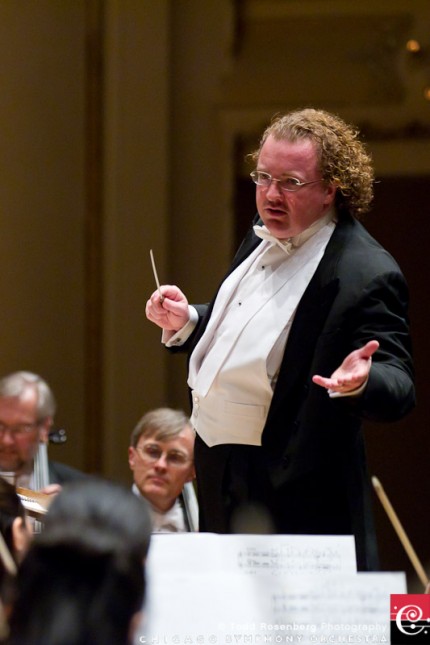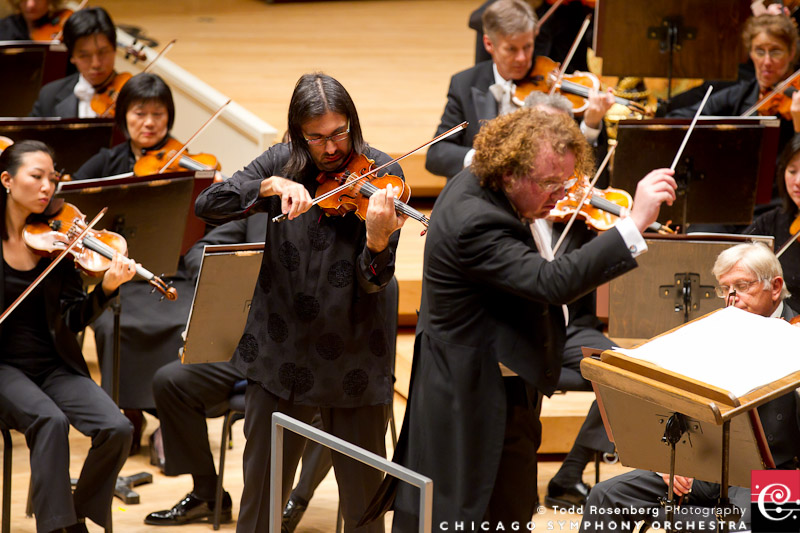Denève strikes sparks in CSO debut

The first two months of the Chicago Symphony Orchestra’s season have been propitious ones for conductors in their Orchestra Hall debuts.
Last month Susanna Malkki made a hugely impressive bow with the CSO. And Thursday night it was the turn of Stéphane Denève who likewise struck sparks with the orchestra in a deftly balanced French and Russian program.
Denève, music director of the Royal Scottish National Orchestra and chief conductor of the Stuttgart Radio Symphony, clearly knows what he wants in his performances and has the intelligence, podium skill, and engaging personality to obtain it. The CSO musicians can be tough customers for new conductors but they clearly enjoyed playing for the frizzy-haired Frenchman as was manifest in the responsive, gleaming performances heard Thursday night.
The first half of the concert concentrated on music of Prokofiev.
The Russian composer established a Chicago connection early in his career, a testament to the enlightened musical patronage of the era. Prokofiev performed his First Piano Concerto with the CSO and Frederick Stock in 1918 and in the same concert led the orchestra himself in the American premiere of his Scythian Suite. Three years later in Chicago, the composer was again the soloist with Stock and the CSO in the world premiere of his Third Piano Concerto. The same year the Chicago Opera Company presented the world premiere of Prokofiev’s opera, The Love for Three Oranges, a work it had commissioned.
The characteristically wry and acerbic comic work may not have stayed long in the operatic repertory but Prokofiev culled a nifty suite from it, which served as an impressive calling card for Denève’s debut.
The score’s sharp contrasts were firmly pointed in this performance, the brash satirical fanfares of “The Eccentrics” given forceful projection, set against the insouciant second theme and Prokofiev’s playful wind writing. The bombastic irony of the Magician was likewise manifest, and Denève brought martial swagger to the famous March, a touching lyricism to “The Prince and The Princess” and whirlwind frenzy to the concluding “Flight” section, all with acute and precisely calibrated balancing.
Violinist Leonidas Kavakos was the evening’s soloist, back after performing with the CSO just last April.
After his eccentric performance of the Sibelius concerto last spring, the Greek violinist seemed much more in synch with Prokofiev’s brand of spiky, astringent lyricism in the evergreen Violin Concerto No. 2.

The tone of Kavakos’s 1724 Abergavenny Stradivarius is not very robust, but the soloist nonetheless communicated the mercurial, jumpy qualities of the music. While this remained a mellow and intimate account — Kavakos brought tonal purity and tenderness to the Andante’s long cantilena — the violinist’s light-fingered bravura sailed through the finale’s marcato hurdles with technique to burn.
Kavakos’s performance was aided immensely by the notably fluent and close accompaniment of Denève and the orchestra. Rarely has this music sounded so French, with the conductor underscoring the myriad details and bringing out the bracing weirdness of the score. Kavakos returned for an encore of Tárrega’s Recuerdos de la Alhambra (Ruggiero Ricci’s arrangement), giving this study in tremolo a hushed and dynamically nuanced reading.
Denève has done much work on behalf of his compatriot Albert Roussel, both through concert performances and a revelatory series of the French composer’s symphonies and other works on the Naxos label.
The conductor elected to present the suite Roussel excerpted from his early ballet, The Spider’s Feast, which fit nicely with the CSO’s “11/12” series this season spotlighting significant works introduced a century ago.
Last played by the CSO under Jean Martinon in 1965, Roussel’s ballet made a timely excavation for one of the 20th century’s major French composers, whose music remains oddly neglected. The shadow of Debussy hovers in this early work but the superbly evocative performance conjured up by Deneve and the orchestra made the strongest possible case.
Certainly the delicacy, textural transparency and refined atmosphere conjured up by Denève and the CSO Thursday night provided masterful advocacy. The diaphanous string playing of the opening section was as delicately spun as the title arachnid’s web. There is a quirky whimsy in the score allied to a hazy sensual quality, both of which were richly conveyed. Denève’s fluent, detailed direction underlined Roussel’s scoring ingenuity from the rather grisly mock grandeur to the charming waltz and little closing cortege for the mayfly. The glowing radiant coda was beautifully rendered.
The Suite No. 2 from Ravel’s Daphnis et Chloe is a much better-known commodity, but here too the performance by Denève and the CSO was first-class in every respect. The conductor did nothing particularly idiosyncratic but just by concentrating on textural transparency and expressive clarity made even this warhorse emerge strikingly fresh with a free wild quality to the animate wind solos of the Dawn opening and a climax that was rich and resplendent yet wholly organic without bombast. The General Dance had a jaunty Gallic lift to it instead of the usual fast and loud dash, yet there was no lack of power and brilliance to the thrilling coda.
The gifted French conductor has earned himself an invitation back to Chicago with these superb performances. Perhaps he can bring one of the neglected Roussel symphonies next time.
NOTE: Earlier this week Mathieu Dufour received the medal making him an Officier dans l’Ordre national des Arts et Lettres from the Consul General of France. The ceremony could not have been better timed since the CSO principal flutist’s musical advocacy on behalf of the Roussel and Ravel works Thursday was remarkable even by his standard– sensitive, technically immaculate and rendered with a grace and understated eloquence all the more beautiful for its seeming simplicty.
The program will be repeated 1:30 p.m. Friday, 8 p.m. Saturday and 7:30 p.m. Tuesday. cso.org; 312-294-3000.
Posted in Performances





Posted Nov 15, 2011 at 2:56 pm by Come and knock on our door . . . « from the archives
[…] Denève, who made an impressive podium debut last week (see here, here, and here), had expressed an interest in the history of the CSO, and one of my colleagues suggested […]